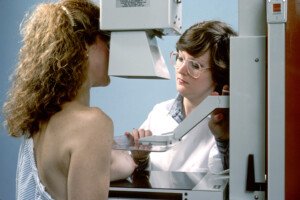
Find out what a breast cancer surgeon has to say about the idea that a mammogram can compress a pre-existing tumor and make it spread.
The compression from a mammogram can hurt quite a bit.
This can make some women wonder if this painful compression could somehow squeeze out an undiagnosed malignant tumor to the point of scattering it beyond its local position.
So the big question becomes: If there’s cancer in the breast, can what feels like excessive compression can make it spread or disseminate it to other parts of the body?
The Answer
“Manipulation of a tumor – whether by exam, compression of a mammogram, ‘disrupting’ the tumor with a needle biopsy, or manipulating the tumor at surgery – has NOT been shown to increase the risk of tumor recurrence or dissemination of metastases,” explains Dr. Steven Standiford, MD, Chief of Staff Emeritus at the Cancer Treatment Centers of America Breast Cancer Institute across all five CTCA sites.
Spread of Cancer Cells
Dr. Standiford explains, “Cancer metastasis is a complex dance between tumor cells separating themselves from the initial tumor, having the biochemical reactions that loosen the bonds between cells so that one can break free, having access to blood vessels or lymphatics to have a highway to travel, avoiding identification by the immune system, and having a site which provides an appropriate milieu for the cell to develop into a metastatic lesion.
“Compression, or exposing the tumor to the air, or any other single factor will not change the nature of the disease, which is determined by the tumor and not how hard it is squeezed.”
In short, malignant breast tumors are “tough” and don’t just break apart.
If you are still concerned about the “spread” of cancer cells during a mammogram, you may want to consider having a whole-breast screening performed via ultrasound — as this does not involve compression of the breast tissue.
You should discuss the pros and cons with your women’s health physician regarding screening technology.
Keep in mind that not all insurance plans will cover the cost of a screening ultrasound, and in fact, the procedure may not even be offered by your health plan.
However, independent imaging centers will provide screening ultrasounds for breast cancer, though you may need an authorization from your doctor to have it done.
 As a part of Dr. Standiford’s life-long commitment to improving cancer treatment, he has partaken in wide-ranging research and has been awarded grants to study breast and colon cancer.
As a part of Dr. Standiford’s life-long commitment to improving cancer treatment, he has partaken in wide-ranging research and has been awarded grants to study breast and colon cancer.
 Lorra Garrick has been covering medical, fitness and cybersecurity topics for many years, having written thousands of articles for print magazines and websites, including as a ghostwriter. She’s also a former ACE-certified personal trainer.
Lorra Garrick has been covering medical, fitness and cybersecurity topics for many years, having written thousands of articles for print magazines and websites, including as a ghostwriter. She’s also a former ACE-certified personal trainer.
.









































